Blog

Blog
Call us today for a free initial consultation on 0800 772 0341
Weighing up the options to keep staff safe and healthy
Published 04 May 2021

Weight and anything related to it can be a touchy subject, so the idea that an employer may ask for your waist size in order to keep you safe is likely to divide opinion.
The Health and Safety at Work Act means employers have always had a legal duty to carry out risk assessments in order to keep employees safe https://worksmart.org.uk/health-advice/health-and-safety/employer-duties/what-health-and-safety-work-act#:~:text=The%20Health%20and%20Safety%20at%20Work%20Act%201974%20(HASAWA)%20lays,visitors%20and%20the%20general%20public.
The outbreak of the coronavirus pandemic (COVID-19) has meant businesses now have to come up with additional ways to protect staff from the virus.
Workplaces have seen the introduction of a range of health and safety measures such as social distancing, one-way systems and partition screens being installed
Now it has emerged that DVLA staff in Swansea have reportedly been asked to provide details of their waist measurement as part of a Covid-19 risk assessment https://www.walesonline.co.uk/news/wales-news/union-outrage-after-dvla-staff-19842589. Such assessments help to manage risk and protect people.
Employees are said to have been asked to indicate if they measured larger than 34 inches for women or 40 inches for men.
The risk assessment also considers other factors such as an ethnic minority background and pregnancy, which can put individuals at risk of serious illness if they catch the virus.
The DVLA said the risk assessment - including the waist size question - was taken directly from Welsh government guidance https://gov.wales/sites/default/files/publications/2021-01/covid-19-workforce-risk-assessment-tool-15-01-21.pdf
The Public and Commercial Services union described asking staff for their waist measurements as ‘demeaning and insulting’.
Living with excess weight puts people at greater risk of serious illness or death from COVID-19, with risk growing substantially as body mass index (BMI) increases https://www.gov.uk/government/news/new-obesity-strategy-unveiled-as-country-urged-to-lose-weight-to-beat-coronavirus-covid-19-and-protect-the-nhs#:~:text=Living%20with%20excess%20weight%20puts,of%20the%20general%20population.
Nearly eight per cent of critically ill patients with COVID-19 in intensive care units are said to have been morbidly obese, compared with 2.9 per cent of the general population.
The Health and Safety Executive (HSE) says that all employers must protect people from harm. It includes taking reasonable steps to protect workers and others from coronavirus https://www.hse.gov.uk/coronavirus/working-safely/risk-assessment.htm.
The HSE says all employers must:
- Identify what work activity or situations might cause transmission of the virus
- Think about who could be at risk
- Decide how likely it is that someone could be exposed
- Act to remove the activity or situation, or if this isn't possible, control the risk.
Employers need to be careful if making any workplace assessments or decisions based on an employee’s weight.
There have certainly been reports of cases in which staff have been treated negatively and even threatened with dismissal because of their weight.
Egypt’s state broadcaster was once reported to have suspended eight female television presenters because it said they were overweight https://www.independent.co.uk/news/world/africa/egyptian-television-station-suspends-eight-female-presenters-being-fat-overweight-a7195486.html
Employment law does not explicitly ban weight-based discrimination.
The European Court of Justice ruled in 2014 that obesity can be considered a disability in certain circumstances. It followed the case of a male childminder in Denmark who says he was sacked because of his weight https://www.bbc.co.uk/news/health-30529791
If obesity hinders an employee’s ‘full and effective participation’ at work then it could count as a disability.
A disability under the Equality Act 2010 is a physical or mental impairment that has a ‘substantial’ and ‘long-term’ negative effect on your ability to do normal daily activities.
Moderate obesity is unlikely to be considered a disability. However, obesity can be associated with other medical conditions such as diabetes, which can themselves amount to disabilities, irrespective of whether or not the obesity itself is a disability.
Employers need to be careful not to make judgements or pass comment on the size and weight of employees, particularly as work can often play a major part in influencing eating and exercise habits.
Most employers can support employees to lead a healthy lifestyle by making work-related changes. It can include providing opportunities for staff to eat healthy by actively promoting healthy choices in staff canteens, offering incentives for those who walk or cycle to work and installing standing desks.
Health Secretary Matt Hancock, launching an initiative in 2018 to encourage employers to improve the health of staff, said businesses should offer staff perks like free fruit, bicycle loans and counselling to help them stay healthy https://inews.co.uk/inews-lifestyle/work/matt-hancock-free-fruit-health-nhs-workers-217637
A reputation built on success
If you're facing any of the issues in this article - or need guidance on disciplinary, grievance, or redundancy matters - call us today. Our expert Trade Union Representatives are available to represent you in crucial workplace meetings, with pay as you need support.